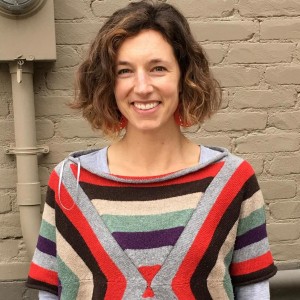Tools
I took my scythe to the bathroom. The vibration was scary, almost. I couldn’t wait to get out
of there. Some of us were standing around with our tools; others of us immediately took to
hacking and battering the ground and nearby bushes.
After a time of holding it awkwardly, I hinged at the elbow to rest the backside of the blade
on my shoulder. I had a conversation and my scythe became a credential, an integral part of
an unspoken power dynamic. The slightest stem of grass leapt from my blade.
After a while I traded it for what I thought was some sort of air gun, but was actually a
blowtorch. It had a long hose that I looped confidently over my shoulder. The urge to faux-
lasso was strong. The urge to become a joke, human + tool, or was it woman + power tool?
The joke. I swung it around, became embarrassed, lurched aimlessly on my feet. My feet like
two clubs: dumb weapons. I didn’t have a flame canister. I felt like a child.
My pickaxe was in someone else’s hands. They drove it again and again into the gravel
road. My breath coming short, hot, wet.
I tried to think of something to say. In my mind I scrolled through celebrity tools, tools of the
founding fathers, tools of religion and self-defense, ordinary tools. I did a small eccentric
dance with my handsaw.
It came to me, suddenly, then, like a shot, like a person who wears a lover with no one inside.
I held my sling at the crux of the Y. I aimed at the sky. The sound was appealing when I hit
the overturned trough, but I preferred the lob of earth arcing through blue.
Back in the bathroom, I’d seen a sign, impossible to read, wasn’t it? When I came out—the
looks of shock on our faces—the tools, still throbbing in our white-knuckled hands.
Alright
—after Paisley Rekdal’s The Wolves
It was the night of histrionics. Histrionics
over everything, probably just tired.
She’d had a really good day. We know
what that’s like. You blink, blink and think this
is alive. But only after. In the good day,
you’re just in it. Then sobbing. Don’t wanna
grow up. Wish I was his age. Wish
I could stay with you, and we didn’t have
to die or knew—I moved in the space
between shushing and the lie.
The lie has felt more truthful lately.
There have been times when I couldn’t.
I felt a jinx lurk, felt its hunger. The oldest fear:
of not knowing if I would be able to keep her safe,
what that betrayal might look like for her,
in the rest of her days. It was too much.
I said nothing. Or said, we can’t know, and this
is the blah blah blah of alive.
Listened, mute, to a spirit come howling
into a small and pitiful creature.
Now I say shush, I say the we can’t know part,
the blah blah blah part. I say big feelings,
and with you, and feel them. And I say it’s alright.
Which bewilders me. I say alright, alright, it’s
alright and I don’t mean “it” and I don’t
mean “right,” just a kind of hum
that’s an aaah I can get behind. I say crazy
ass shit like never gonna leave you and
always be with you, and I don’t worry
about the hungry jinx.
When she gets a little older, I will give her
a mad-eyed smile. I’ll put my stone cold finger
in her sternum and say, I will HAUNT you,
and she will laugh and shake her head.
But even at six she knows. My cells
her blood my dust her hair my breath.
Her lungs. I’m not leaving.
It was a good day.
And other things, too. What
is the difference now.
biography

ELLEN WELCKER has poems recently in Dusie, Willow Springs, and Small Po[r]tions, as well as collected in the chapbooks Mouth That Tastes of Gasoline (alice blue, 2014) and The Urban Lightwing Professionals (H_NGM_N, 2011), and a book called The Botanical Garden (Astrophil, 2010). Her second collection, Ram Hands, is forthcoming in 2017. She lives in Spokane, WA, where she coordinates the Bagley Wright Lecture Series on Poetry and co-facilitates Scablands Lit, an organization that supports writers in the Inland Northwest.